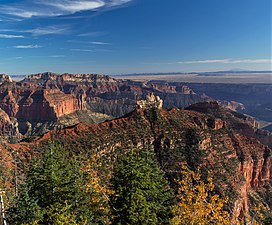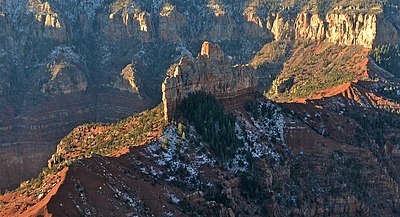Brady Peak
| Brady Peak | |
|---|---|
 Southwest aspect, from Vista Encantada | |
| Highest point | |
| Elevation | 8,121 ft (2,475 m)[1] |
| Prominence | 481 ft (147 m)[1] |
| Parent peak | Mount Hayden (8,362 ft)[2] |
| Isolation | 2.07 mi (3.33 km)[2] |
| Coordinates | 36°14′34″N 111°57′49″W / 36.2428607°N 111.9635090°W[3] |
| Naming | |
| Etymology | Peter Rainsford Brady |
| Geography | |
| Location | Grand Canyon National Park Coconino County, Arizona, US |
| Parent range | Kaibab Plateau[1] Colorado Plateau |
| Topo map | USGS Walhalla Plateau |
| Geology | |
| Rock age | Permian |
| Rock type | Coconino Sandstone, Hermit Shale |
| Climbing | |
| Easiest route | class 5.2 climbing[2] |
Brady Peak is an 8,121-foot (2,475 m)-elevation summit located in the Grand Canyon, in Coconino County of northern Arizona, United States.[3] It is situated one mile (1.6 km) northeast of the Vista Encantada viewpoint on the canyon's North Rim, where it towers 4,800 feet (1,500 m) above the bottom of Nankoweap Canyon. Its nearest higher neighbor is Mount Hayden, two miles (3.2 km) to the north, Kibbey Butte is one mile to northwest, and Alsap Butte lies one mile to the northeast.[1] Brady Peak is named after Peter Rainsford Brady (1825–1902), a pioneer and politician of the Arizona Territory.[3] This geographical feature's name was officially adopted in 1932 by the U.S. Board on Geographic Names.[3] According to the Köppen climate classification system, Brady Peak is located in a cold semi-arid climate zone.[4]
Geology
The summit spire of Brady Peak is composed of cream-colored Permian Coconino Sandstone.[5] This sandstone, which is the third-youngest of the strata in the Grand Canyon, was deposited 265 million years ago as sand dunes. Below this Coconino Sandstone is reddish, slope-forming, Permian Hermit Formation, which in turn overlays the Pennsylvanian-Permian Supai Group. Precipitation runoff from this feature drains east into the Colorado River via Nankoweap Creek.

See also

(On horizon: East flank of Walhalla Plateau (Kaibab Plateau))
References
- ^ a b c d "Brady Peak, Arizona". Peakbagger.com. Retrieved 2021-01-07.
- ^ a b c "Brady Peak – 8,121' AZ". Lists of John. Retrieved January 1, 2021.
- ^ a b c d "Brady Peak". Geographic Names Information System. United States Geological Survey, United States Department of the Interior. Retrieved 2021-01-07.
- ^ Peel, M. C.; Finlayson, B. L.; McMahon, T. A. (2007). "Updated world map of the Köppen−Geiger climate classification". Hydrol. Earth Syst. Sci. 11. ISSN 1027-5606.
- ^ William Kenneth Hamblin, Anatomy of the Grand Canyon: Panoramas of the Canyon's Geology, 2008, Grand Canyon Association Publisher, ISBN 9781934656013.

External links
- Weather forecast: National Weather Service
- Brady Peak rock climbing: Mountainproject.com


